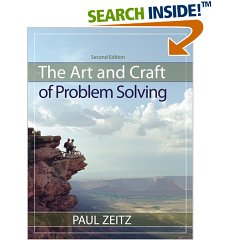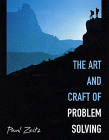






|
|---|

|

|

|

|
 In association with
Amazon.com
(Statement of Intent)
[ Search Amazon.com Books by:
Author/Title/Subject
|
ISBN
|
Publisher/Date
|
Boolean Expression
]
In association with
Amazon.com
(Statement of Intent)
[ Search Amazon.com Books by:
Author/Title/Subject
|
ISBN
|
Publisher/Date
|
Boolean Expression
]
 Another book that will help you become a good math problem solver,
by distinguishing `mere' exercises from
(challenging, unpredictable) real problems
(the author participated in IMO 1974):
Another book that will help you become a good math problem solver,
by distinguishing `mere' exercises from
(challenging, unpredictable) real problems
(the author participated in IMO 1974):
This book includes tables that list participating countries and their performance at IMOs from the beginning in 1959 to 1985.
Includes solutions. From the preface: ``This collection of problems is directed to students in high school, college and university. Some of the problems are easy, needing no more than common sense and clear reasoning to solve. Others may require some of the results and techniques which we have included in the Tool Chest [15 pages with results from Combinatorics, Arithmetic, Algebra, Inequalities, Geometry and Trigonomotry, and Analysis]. None of the problems require calculus... They could be described as challenging, interesting, thought-provoking, fascinating.''
From the preface: ``There is a significant gap between what most high school mathematics programs teach and what is expected of an IMO participant. This book is part of an effort to bridge that gap.''
Chapters on Numbers, Algebra, and Combinatorics. Explains some theory, provides examples, exercises and solutions.
From the preface: ``This is unashamedly a book for beginners. Unlike most Olympiad problem books, my aim has been to convince as many people as possible that Mathematical Olympiad problem are for them and not just for some bunch of freaks.''
Note that Martin Gardner, Ian Stewart (among others) are authors of many interesting mathematics books.
In alphabetic order of (first) author:
This book also deals with Physics, Biology, and Computing Science (although the author treats these topics as mathematics). It contains an appendix on further reading with extensively documented recommendations.